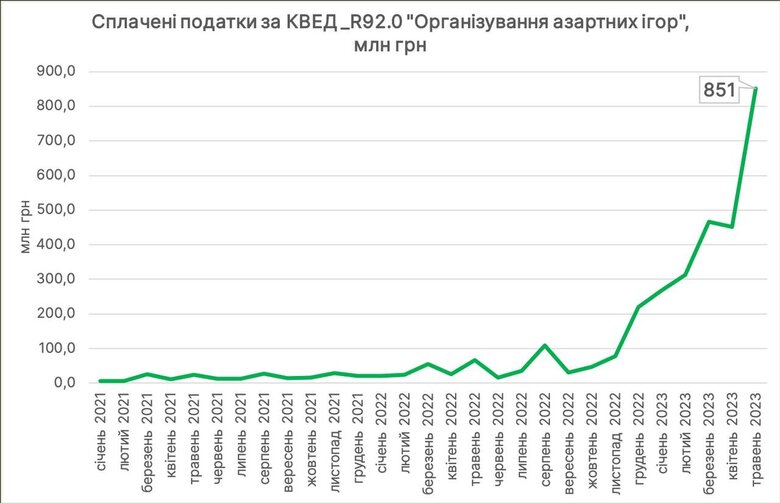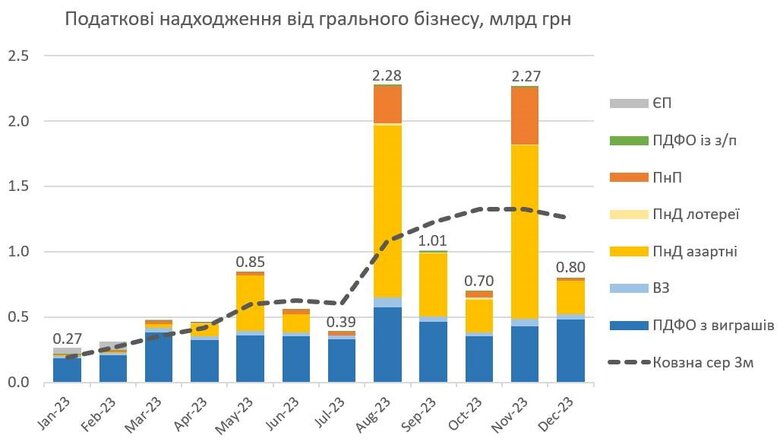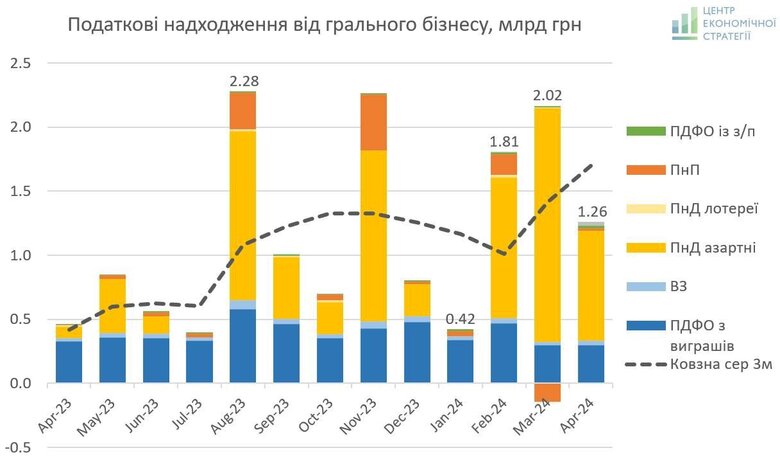В условиях полномасштабной войны государство заставило игорный бизнес начать платить налоги. Однако прибыли операторов онлайн-казино растут, в том числе благодаря военнослужащим, а десятки миллиардов гривен все еще остаются «в тени» и не доходят до госбюджета.
Продолжаем цикл материалов о теневых схемах из-за которых бюджет недополучает сотни миллиардов гривен. Предыдущие материалы о том, почему никто не может найти производителей нелегальных сигарет, где спрятаны три годовых бюджета на производство дронов, и о схемах с экспортом «черного зерна» на миллиарды долларов США читайте по ссылке.
В прошлом месяце стремительное распространение азартных игр, прежде всего среди военных, стало предметом беспокойства Офиса президента. Президент Владимир Зеленский своим указом ввел в действие отдельное решение СНБО, призванное запретить военным доступ к онлайн-казино и ограничить рекламу азартных игр.
Легальные игроки азартного рынка утверждают, что платят налоги.
Действительно, на третий год после легализации азартных игр, что было одним из предвыборных обещаний Зеленского, госбюджет таки начал получать существенные поступления от этого решения.
По данным Комиссии по регулированию азартных игр и лотерей (КРАИЛ), за 2023 год игорный бизнес уплатил в государственный бюджет 10,4 млрд грн налогов, не считая платы за лицензии. Это в 14 раз больше, чем в 2022 году. Однако это в семь раз меньше, чем должен был бы.
Как недоплачивали налоги легальные игроки?
В начале второго года полномасштабной войны легальному игорному бизнесу пришлось частично выйти из тени. В начале февраля 2023 года Владимир Зеленский подписал закон, которым отменил принятую еще в апреле 2022 года норму, которая позволила игорному бизнесу использовать упрощенную систему налогообложения, платя лишь 2% единого налога.
Председатель Комитета Верховной Рады по вопросам финансов, налоговой и таможенной политики Даниил Гетманцев признавал, что из-за внедрения в начале российской агрессии налоговых льгот для игорного бизнеса государство потеряло миллиарды гривен. В то же время ключевая проблема игорного бизнеса, по мнению Гетманцева, заключалась даже не в льготах, которыми он пользовался почти год, в системном уклонении от налогообложения с помощью электронных технологий расчетов.
Удар по этим схемам в марте 2023 года нанес Нацбанк, лишив лицензий ряд финансовых компаний и «Айбокс-банк» из-за причастности к преступной схеме уклонения от уплаты налогов игорным бизнесом.
В причастности к таким схемам подозревали и государственный «Укргазбанк», однако в этом случае Нацбанк ограничился существенным штрафом, а глава банка Андрей Кравец сразу же после обнародования этой информации уволился.
По данным ВСК Верховной Рады по вопросам экономической безопасности, благодаря привлечению банков к схемам с «мискодингом» (подменой назначения платежей), игорный бизнес во время войны смог вывести «в тень» около 10 миллиардов гривен оборота в месяц.
Как писал БизнесЦензор, десятки миллиардов гривен, с которых не уплачены налоги, игорный бизнес выводил за границу во время войны через операции по экспорту «черного» зерна или криптовалюту.
После того, как государству удалось существенно ограничить эти возможности, уплата налогов представителями легального игорного бизнеса резко возросла.

Однако она должна была бы быть значительно больше.
Сколько налогов должен был бы заплатить легальный игорный бизнес?
Какие налоги должны платить легальные игроки
- Налог на доход
- Налог на прибыль
- НДФЛ и военный сбор с выигрышей
- НДФЛ и военный сбор с зарплат работников
Согласно налоговому кодексу, кроме налога на прибыль, легальные игроки должны платить 18% от дохода, полученного от деятельности в сфере организации и проведения азартных игр (для организаторов азартных игр в залах игровых автоматов установлена ставка 10%), уменьшенного на сумму выплаченных выплат игрокам.
В то же время организатор азартных игр должен удерживать и перечислять в госбюджет 18% налога на доход физических лиц и 1,5% военного сбора с выигрышей игроков.
По данным Нацбанка, обнародованным председателем Комитета по вопросам финансов, налоговой и таможенной политики Даниилом Гетманцевым, объем безналичных операций в легальном сегменте азартных игр в 2023 году вырос 83 млрд грн, а общий оборот увеличился до 207 млрд грн.
«Эти данные отражают объемы, которые были представлены поставщиками платежных услуг, которые обслуживали лицензированных операторов азартных игр и лотерей, и включают как безналичный оборот средств по коду 7995 (транзакции, связанные с азартными играми, лотереями и букмекерами, — ред.), так и наличные операции», — пояснили в Нацбанке на запрос БизнесЦензора.
То есть, 207 млрд грн — это общий оборот только легальных игроков игорного рынка. Следовательно, с учетом налога на доход и налогов с выигрышей, организаторы азартных игр должны были перечислить в госбюджет не менее 18% от общей суммы оборота — 37,3 млрд грн. Кроме того, игорный бизнес и букмекеры должны были уплатить налог на прибыль и зарплату и удержать 1,5% военного сбора с выигрышей.
Однако поступило в государственный бюджет от игорного бизнеса даже с учетом других налогов только 10,4 млрд грн или на 26,9 млрд грн меньше, отмечала коллега Гетманцева по налоговому комитету Нина Южанина. С учетом военного сбора, который должен был бы удерживаться из выигрышей, эта сумма должна была бы быть еще больше.
Впрочем, в первые месяцы прошлого года платить меньше налогов игорному бизнесу позволило само государство, затягивая отмену возможности платить только единый налог в размере 2% от дохода. Кроме того, только в августе 2023 года Верховная Рада вернула налог на валовой игровой доход для онлайн-казино (так называемый налог GGR) на уровне 18%. До этого неточная формулировка в Налоговом кодексе позволяла им уклоняться от уплаты этого налога.

Что не так с налогообложением выигрышей?
Председатель КРАИЛ Иван Рудый уверяет, что 70-80% полученных от игроков средств организаторы азартных игр возвращают в виде выигрышей, которые должны облагаться налогом.
Но проверить это невозможно, ведь до сих пор не создана Государственная система онлайн-мониторинга, предусмотренная законом «О государственном регулировании деятельности по организации и проведению азартных игр». Эта система должна была бы обеспечить контроль информации обо всех ставках и уплаченных выигрышах в режиме реального времени.
КРАИЛ только 17 апреля этого года объявила тендер на разработку технической и проектной документации на создание системы онлайн-мониторинга, когда она заработает — пока неизвестно. Глава регулятора Иван Рудый объяснял, что средств на создание самой системы пока не предусмотрены из-за войны.
Проблемы с налогообложением выигрышей подтверждает Бюро экономической безопасности (БЭБ), которое подозревает одного из крупнейших игроков рынка азартных игр — компанию «Космолот» в уклонении от уплаты налогов.
По данным следствия, компания выплатила игрокам 4,5 млрд выигрышей, с которых не уплатила налог на доходы физических лиц и военный сбор на общую сумму 1,1 млрд грн. Усложняет расследование дела то, что без системы онлайн-мониторинга детективам приходится анализировать более 5 млн банковских транзакций оператора азартных игр.
Кроме того, ГБР расследует дело против операторов онлайн-казино Pin-Up и Vbet. Среди прочего, их также обвиняют в уклонении от уплаты налогов и отмывании денег.
Все три указанные компании входили в пятерку крупнейших компаний в сфере азартных игр в Украине по итогам 2023 года.
Старший экономист ЦЭС Юрий Гайдай отмечает, что в 2024 году легальный сегмент игорного бизнеса продолжает расти, а налоговые поступления от него достигли 1,7 млрд грн в месяц. В то же время объем удержанных операторами налогов с выигрышей наоборот — падает.
«Рост происходит за счет уплаты налога с gross gaming revenue, при этом НДФЛ с выплаченных выигрышей стагнирует после пика год назад и совсем не соответствует реальным объемам рынка», — констатирует эксперт.

Сколько теряет бюджет из-за нелегального игорного рынка?
По словам главы КРАИЛ Ивана Рудого, легальный рынок азартных игр — это 13 юридических лиц, которые работают на «земле» и 17 — в сети интернет.
«Нелегальный рынок азартных игр — это более 600 сайтов (это только те, о которых известно КРАИЛ и по которым совместно с правоохранителями мы ведем работу по блокированию доступа на территории Украины)», — отмечает чиновник.
В обнародованный КРАИЛ перечень нелегальных сайтов по состоянию на 16 мая внесено 264 домена, владельцам которых направлены требования по ограничению доступа на территории Украины. Однако значительная часть из них до сих пор продолжает работать. Только 15 мая Национальная комиссия, осуществляющая государственное регулирование в сферах электронных коммуникаций (НКЭК), рекомендовала провайдерам электронных коммуникационных сетей заблокировать 242 сайта с азартными играми из перечня КРАИЛ.
По оценке объединения легальных игроков игорного рынка Ukrainian Gambling Council, количество нелегальных сайтов с азартными играми еще больше — более 1200, среди них не менее 300-400 имеют связи с РФ.
Подсчеты легальных игроков рынка и Центра экономических стратегий свидетельствуют, что по итогам прошлого года «в тени» продолжало оставаться около 50% игорного бизнеса. То есть из-за нелегальных букмекеров и онлайн-казино госбюджет теряет ориентировочно еще 37 млрд грн.
С учетом того, что легальный бизнес также должен был бы заплатить почти на 27 млрд грн больше, в целом потенциальные потери госбюджета от неуплаченных налогов в сфере игорного бизнеса можно ориентировочно оценить в 64 миллиарда гривен.
Для сравнения, на закупку дронов в госбюджете на 2024 год предусмотрено 44 млрд грн, за эту сумму предварительно планируют приобрести для Сил обороны 1 миллион БПЛА. При этом Украина могла бы производить вдвое больше беспилотников, но на их приобретение не хватает средств, признавал вице-премьер Михаил Федоров. Если бы государство смогло собрать налоги с игорного бизнеса, финансирование закупки БПЛА можно было бы увеличить в 2,5 раза, загрузив мощности украинских производителей.
По словам председателя Налогового Комитета Верховной Рады Даниила Гетманцева, по крайней мере частично эту проблему должен решить законопроект N9256-д, который планируют рассмотреть в парламенте в ближайшее время. Среди прочего, им предлагается усилить контроль за деятельностью легальных операторов азартных игр, а также существенно расширить механизм блокировки нелегальных игорных сайтов. Кроме того, планируют ввести ограничения для игроков и запретить спонсорство и рекламу азартных игр.
Однако пока государственное регулирование не успевает за бурным развитием игорного бизнеса, а госбюджет теряет десятки миллиардов гривен потенциальных налоговых поступлений во время войны.


